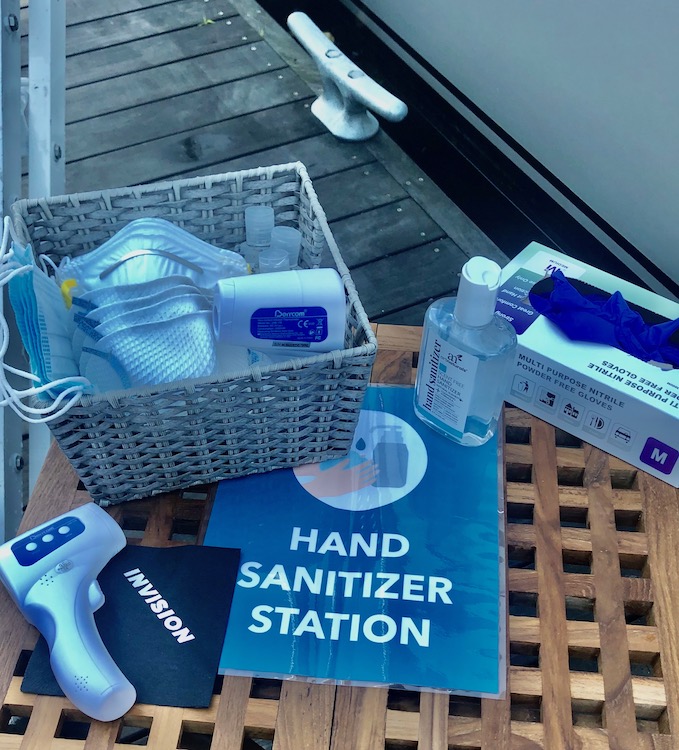Health and Safety Updates
The Coronavirus pandemic has changed how we do many things, including travel. There has been a surge in travel now and health and safety is still paramount on everyone’s mind. Across the world, protocols are in place and frequently changing to help assure safety for yacht guests and crews. Here are some high-quality resources to help you plan for a safe travel experience.
Yacht Charter Cleanliness Best Practices
The following practices are recommended by VIPCA (Virgin Island Professional Charter Association) in compliance with suggestions released by the Center of Disease Control, the U.S. Food & Drug Administration, the American Cleaning Institution, and the World Health Organization. By creating a standard of expected cleanliness, the charter industry can give guests peace of mind regarding preventive measures taken to protect the health of themselves and their crew. VIPCA encourages all of its members to follow government standards and laws regarding COVID-19.
Definitions:
“Cleaning” suggests wiping away residues, dirt, grease and other debris, but only removes these items on surfaces, and does not kill or remove harmful bacteria, germs, or microorganisms.
“Sanitizing” reduces the microorganisms on a surface to a safe level, based on established parameters. Sanitizers should contain 70% or more alcohol and should not be substituted for proper hand-washing.
“Disinfecting” destroys specific infectious microorganisms on hard surfaces. Strong chemicals are usually used and may be toxic and if used on food surfaces and consumed. Proper rinsing and drying the surface to remove the chemical is a must.
Effective Disinfectant Solutions:
When using a disinfectant or sanitizer on surfaces, contact time is important. Contact time is the amount of time the chemical needs to be left on surfaces to completely kill the microorganisms before wiping the chemical off. The times listed here are minimums.
3% Hydrogen peroxide – dilute to 0.5% concentration – contact time one minute
100% Rubbing Alcohol – dilute to 70-80% concentration (100% alcohol evaporates too quickly to be effective) – contact time 30 seconds
Disinfectant wipes – contact time four minutes
Bleach – Dilute 1/3 cup bleach in one-gallon water (four teaspoons in one-quart water) – contact time one minute. Some versions of bleach are not intended to be used as a disinfectant (check the label). Do not mix bleach with any other chemical.
Protect yourself while using disinfectants to clean surfaces and objects. Fumes may be harmful to breathe and chemicals may be harsh on skin. Wear masks and gloves when needed. Keep all disinfectant solutions out of reach from children.
For additional information on disinfecting and preventive measures: https://www.cdc.gov/coronavirus/2019-ncov/prevent-getting-sick/disinfecting-your-home.html
For a complete list of EPA approved disinfectants for use against COVID-19: https://www.epa.gov/pesticide-registration/list-n-disinfectants-use-against-sars-cov-2
Sanitary Recommendations for Crew (Before Charter)
Obtaining Provisions:
Utilize provisioning services or grocery store order-ahead options to avoid leaving the boat to shop when available. Remember, the items you bring into your boat may have coronavirus on its surface.
Once provisions are delivered, do the following:
- Wash your hands for at least 20 seconds with soap and water before and after handling provisions, packages and mail
- Break down and discard excess cardboard and plastic packaging
- Wash fruits and vegetables in one-part vinegar to two parts water for 30-60 seconds
- Wash all reusable grocery bags before reusing
- Disinfect all surfaces where provisions were placed prior to being stowed in the boat
If utilizing provisioning services or grocery store order-ahead options are not available to you, do the following:
- Go shopping at a time less likely to be crowded
- Maintain a six-foot distance from other shoppers and store employees when possible
- If possible, visit a store that limits the number of customers allowed inside at one time and making sure that people stay a safe distance apart while waiting in line outside
- Cover your mouth and nose with a cloth face covering
- Sanitize the handles of shopping trolleys or baskets before shopping
- Once back on the boat, wash your hands thoroughly and also after handling and storing your purchased products
Cleaning:
- All vessels should be meticulously cleaned to the standards listed prior to welcoming guests onboard
- Continue with normal routine cleaning, this will decrease how much of the virus is on surfaces and objects, which reduces the risk of exposure
- Frequent disinfection of surfaces and objects touched by multiple people is important before and throughout the charter
- Clean all interior surfaces thoroughly with a disinfectant solution, including walls, countertops, tables, light switches, handrails, and doorknobs
- Exterior surfaces should also be washed down thoroughly and special attention should go to disinfecting dining areas, coolers, trash bins, and any common guest use items touched frequently like ice boxes, sunscreen bottles, and sliding door handles
- All guest linens and towels should be freshly laundered including mattress protector, pillow protectors, and throw pillow covers
- Spray throw pillows and salon cushions with disinfectant (test first!) and leave in the sun to dry
- For more information on cleaning best practices: https://www.cleaninginstitute.org/coronavirus-cleaning-information
Communication and Education
Communicating Health Safety with Guests:
- It’s important that both crew and guests engage in conduct that ensures the health safety of all onboard.
- Here are some recommendations to share with your guests before they arrive:
- Guests should contact their healthcare provider if they have concerns about COVID-19 before traveling
- While traveling to their destination, guests should wipe down all surfaces around their airplane seats and taxi seats with disinfecting wipes
- Wash hands frequently while traveling and avoid touching mouth, face, eyes and nose
- When greeting the crew, please use verbal greetings rather than handshakes or hugs
- Once onboard, guests are encouraged to change their clothes in their bathrooms, isolate those clothes in a plastic bag, then wash their hands with soap and water
- Guests are expected to wash their hands before all meals
- High-risk guests may need to take extra precaution or seek medical advice before traveling
Communicating Personal Health Safety:
- It’s important that yacht crew are comfortable and transparent in their willingness to accommodate guests
- Yacht crew who have health concerns regarding COVID-19 or are high risk are encouraged to communicate their concerns to the appropriate identity (managing company or yacht owner)
- Communicate the precautionary steps you are taking with your guests and broker prior to the charter
Sanitary Recommendations for Crew (During Charter)
Sanitation and Cleanliness:
- Ensure proper cleaning of living spaces, beds and heads:
- Dining table, galley countertops and high-traffic areas should be sanitized multiple times per day
- Guest cabins and heads should be cleaned daily with disinfectants for toilets, counters, knobs, handles, etc. while wearing gloves
- Charter yachts offering mid-week sheet changes, daily turn ups and turn downs may consider doing this on a needed basis going forward to limit contact and reduce storage of laundry
- Have guests hang their own towels and wet clothes to reduce contact
- Remain diligent in the frequent cleaning of galley & dining areas:
- All dishes should be washed in hot water with dish soap, or in a dishwasher if available
- Dish towels and sponges should be changed out frequently
- Crew will wash hands prior to any food service, food prep, or cooking
Additional Considerations:
- Carry hand sanitizer in the dinghy
- Explain in safety briefing steps everyone will need to take to maintain a clean vessel while living in close proximity








